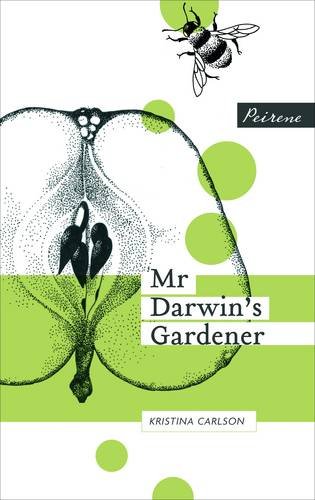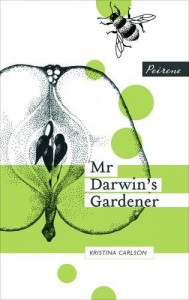Mr Darwin’s Gardener by Kristina Carlson (trans. Emily & Fleur Jeremiah)
-Reviewed by Richard T. Watson–
You’ve heard, I’m sure, of Charles Darwin. You might not have heard of Thomas Davies, who, in Kristina Carlson’s Finnish novella, looks after the great man’s garden as he whiles away his twilight years of the 1870s in the Kentish village of Downe.
But neither man is really the focus of Mr Darwin’s Gardener, the eleventh translation by Peirene Press of a European novella designed to be consumed in one sitting. In fact, Darwin appears only as an offstage presence, spoken of and admired but never actually seen. His influence, however, can be felt in the book’s ongoing debate about the existence and nature of God.
Though Darwin himself never gave a definitive answer to the question of his own, probably agnostic, beliefs – despite rumours to the contrary – his published works gave strength to the atheist movement in Britain, which was growing in size and weight in the 1870s. Darwin’s most famous work, On the Origin of Species, published in 1859, along with Darwin’s reputation as a respected scientist and writer, had helped make the scientific explanation for life on Earth not only socially acceptable but also fashionable in some circles. Whatever Darwin’s intentions had been, the book led to a campaign to take science out of the realms of theology and church influence into a secular world.
Like many scientific theories now taught as fact in school classrooms, the theory of evolution and natural selection faced opposition from both the church and other scientists, and its acceptance was very much a top-down affair. Darwin was surrounded by people who inherently trusted the idea of the creator God and his Saviour son, even if they weren’t ardent theists. Darwin’s work, respected as it was for scientific rigour and worldwide acclaim, as well as for the dignity and respectability of its author, undermined beliefs held for generations. It’s these people – ordinary Kentish people, not scientists, academics or theologians – who take the focus of Carlson’s novella, as they deal with a pre-eminent Victorian celebrity in their village and the consequences of his work.
Like The Brothers, this is a Finnish work translated by the mother-and-daughter team of Fleur and Emily Jeremiah, and like that earlier book it has an aversion to single point-of-view storytelling. It would be interesting to know if the original Finnish makes any clear distinction between the voices that doesn’t carry across the language barrier, or indeed if this pattern of shifting narrators is a peculiarly Finnish literary trait.
Unlike your usual Victorian novel, Mr Darwin’s Gardener discards the all-seeing, all-knowing, ever-present narrator, and instead puts the reader into the heads of a dizzying array of narrators: the villagers. So sometimes, Davies is our first-person narrator, sometimes the village doctor narrates, the vicar, the shopkeeper, their wives, daughters and nieces. It’s not as though Carlson (or the Jeremiahs) leave clear breaks between different voices either; the text slides from one voice to the next so smoothly that you can be halfway through a paragraph before you realise that the speaker has changed. The transitions are slight, barely getting in the way of narrative flow, and building a torrent of voices and perspectives that give a fuller picture of village life than any single narrator could manage.
Perhaps the villager most profoundly affected by Darwin’s work is Thomas Davies the gardener, who takes on his employer’s ideas more than the others and – not unlike Darwin himself – avoids the village church. Early in the book, he stands in a storm, Lear-like, crying to the heavens for help and trying to drown the grief for which he finds no solace in religion. Meanwhile, the villagers sit in their pews and wonder at the godlessness of the gardener. There’s the heart of the novella: Davies has lost his faith (because of his wife’s death and because of Darwin) and the villagers still believe (they haven’t yet come to terms with the ideas of the man who lives in their ‘big house’).
But it’s about more than just God and evolution and natural sciences; it’s about human conscience as well. The villagers have a whole plotline running alongside the Darwin-Davies one, which doesn’t involve either of those men. It’s a rather undignified response to an unpleasant moment in the village’s past, but a very human one. Humanity and what makes us human is a key concern of Mr Darwin’s Gardener, as exemplified in the constant battle between intellectual reason and animal instinct. Witness the village’s men intellectualising their guilt over what they’ve done on recognising the stranger who arrives halfway through the book, or the fact of evolution considered against the instinctive trust in the church and religion.
Alongside all that, Darwin’s role a naturalist and biologist comes through in frequent pastoral moments – not least Davies’ work in the garden of a world-famous scientist. But there’s a passage towards the end in which Carlson devotes pages to the English countryside in spring time. The rabbits, the frogs, the crows, the butterflies, the ginger tom cat trying to kill things but satisfying itself by stretching out on a warm wall instead. Even the switching narrator voice sometimes finds itself inside the heads of the jackdaws on the church roof, or the chickens down on the ground. Surrounded by all this verdant nature, it’s no wonder that a man like Charles Darwin asked big questions about the nature and development of life on Earth.
With Mr Darwin’s Gardener, Peirene Press has delivered another intense and thought-provoking dose of European literature, which manages to punch above the weight implied by its small size.





